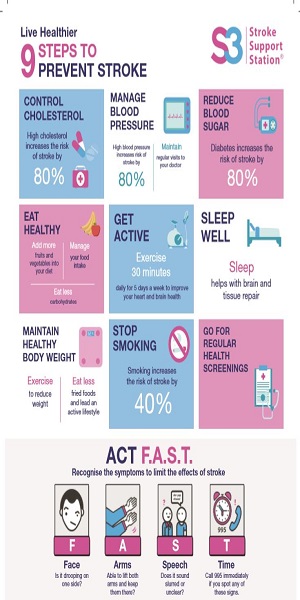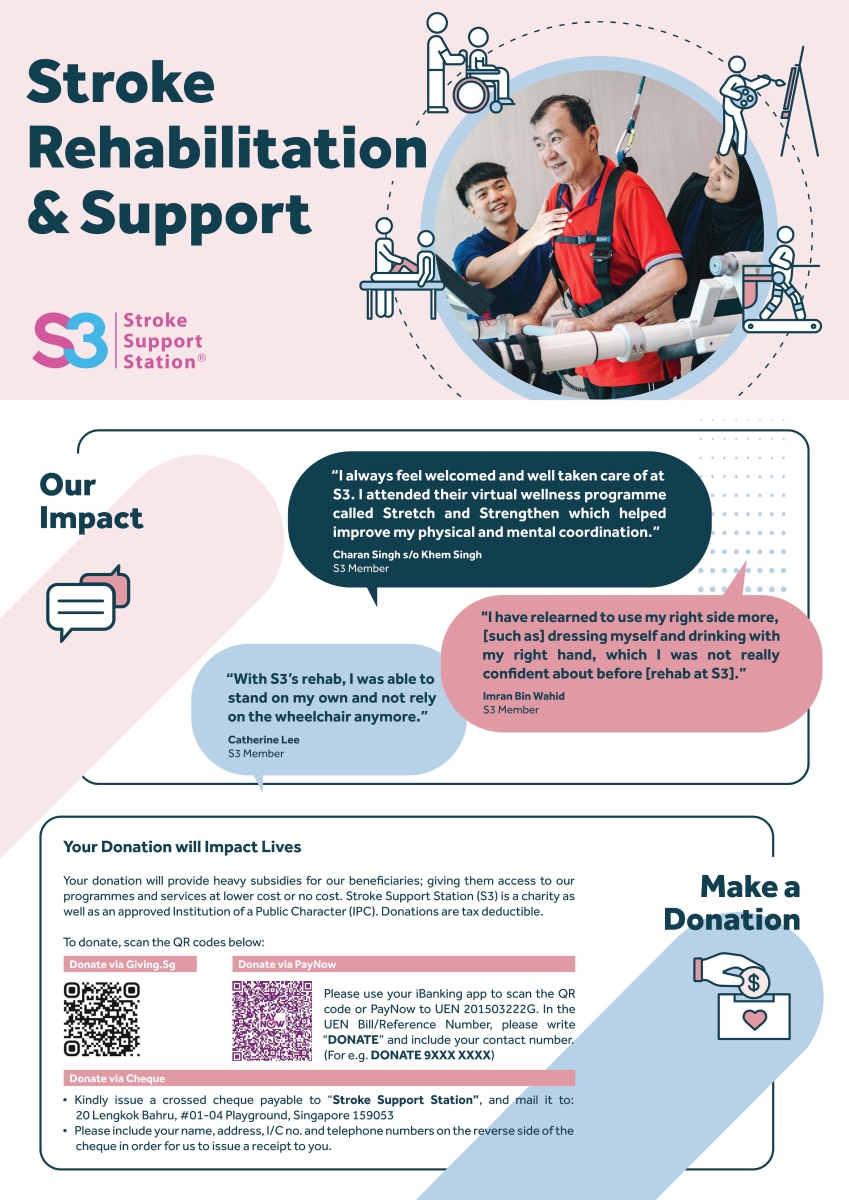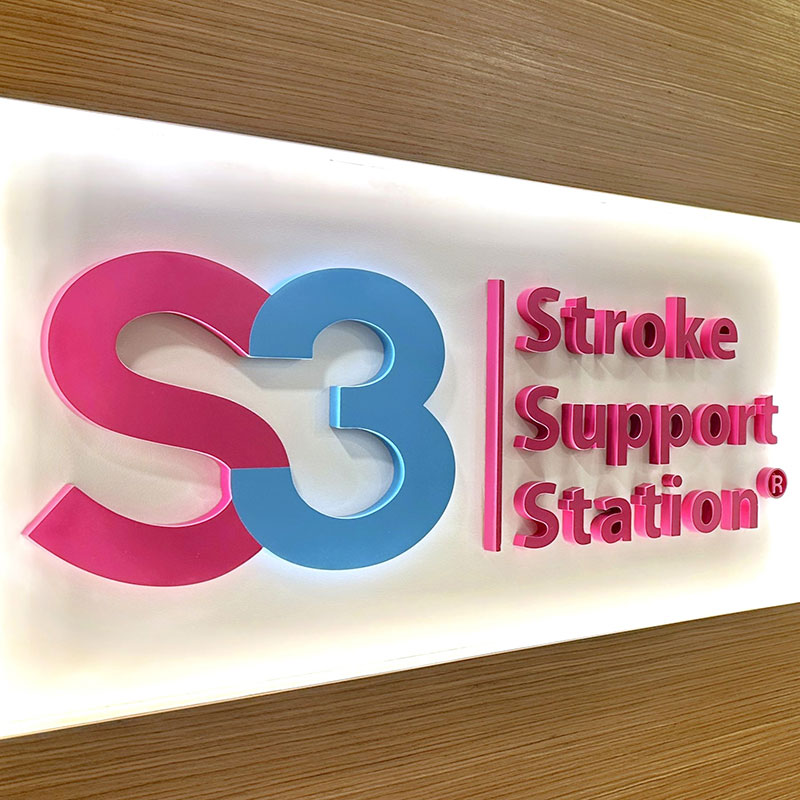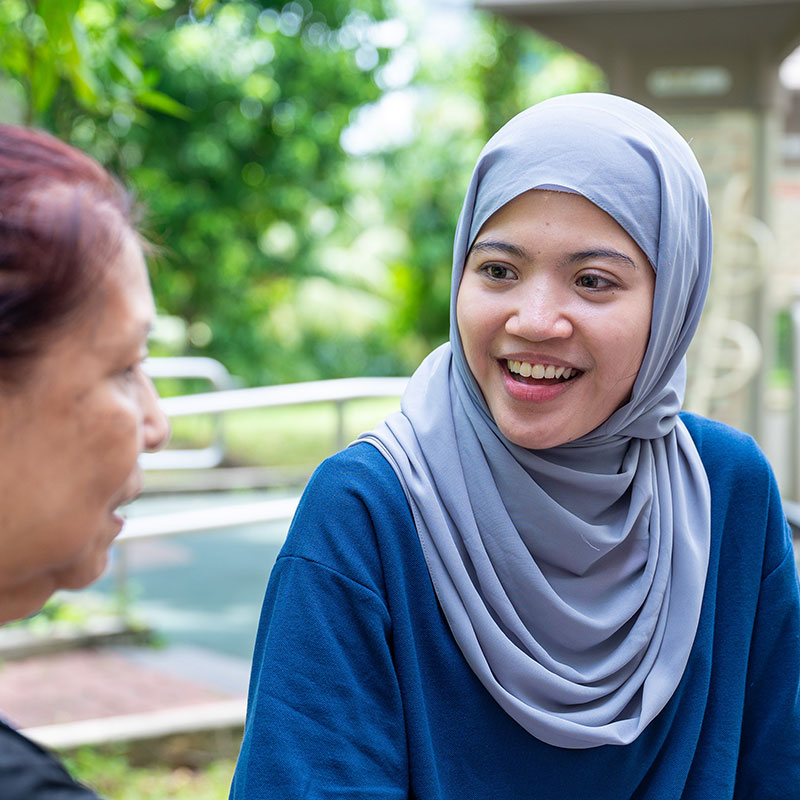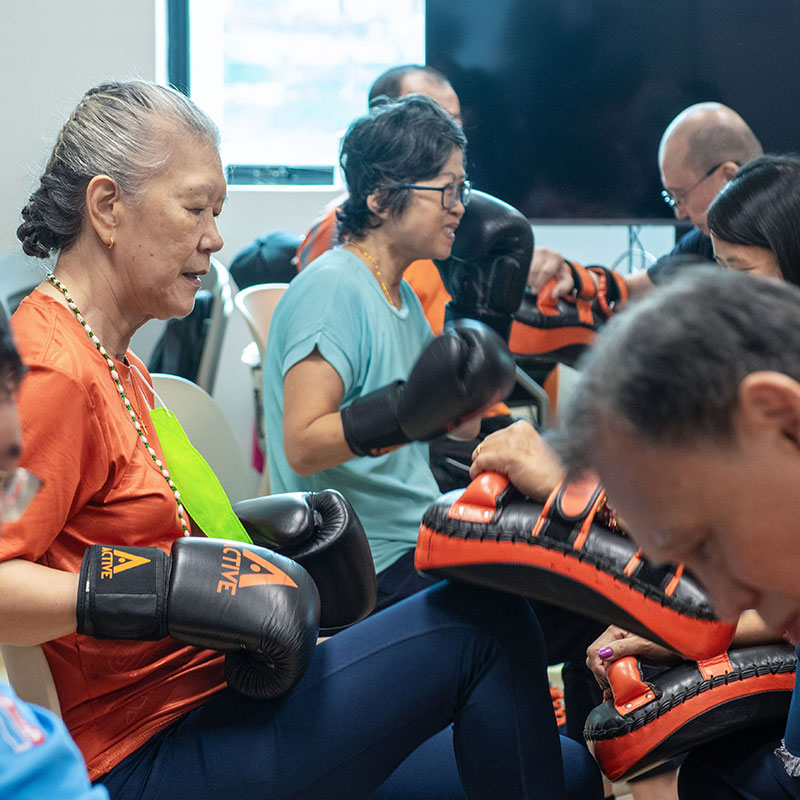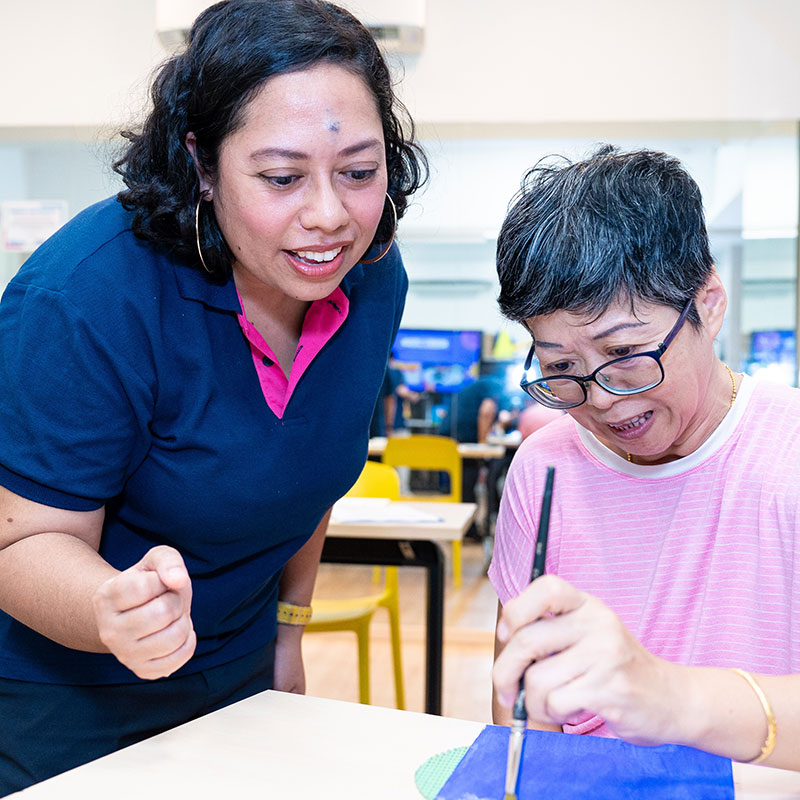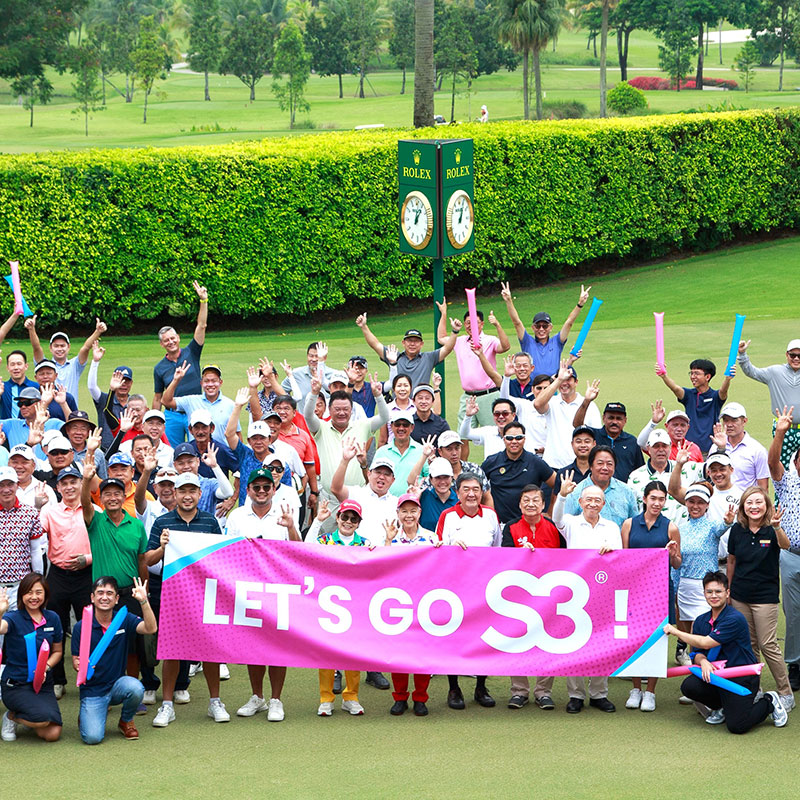Useful Resources
The challenges faced by persons affected by stroke and their caregivers in the recovery journey are often multi-faceted. Financial difficulties are a commonly reported obstacle as fees for stroke rehab services are often high, which can make rehab inaccessible for some. Often, people are also uncertain of where they can find more help to make the recovery journey easier.
Here, we share some useful links and resources that can provide some assistance for persons affected by stroke and their caregivers. Click the links below to learn more.
ComCare
ComCare provides financial assistance to low-income families to support their basic living expenses. Are you facing a crisis and you or your loved one is unable to work and support the basic needs of your family? Are you earning too little and do not have enough savings to support your family? Click the link below to find out what help is available for you with ComCare!
https://www.msf.gov.sg/what-we-do/comcare
Assistance Finder
Not sure which scheme, assistance or support you are eligible for? Visit the link below to explore what options are available for you:
https://supportgowhere.life.gov.sg/eligibility
The ONE Emergency Fund
What if you do not have the time to apply and wait for assistance to reach you? The ONE Emergency Fund provides financial and in-kind assistance to low-income individuals and families who require urgent help but cannot find it elsewhere or in time. Find out more here:
https://onesingapore.org/take-action/emergency-fund/
Medifund
Do you have difficulties paying for your hospital bills even after receiving subsidies and schemes such as MediShield Life and MediSave? You may approach a medical social worker to help you apply for Medifund. Learn more here:
https://www.moh.gov.sg/healthcare-schemes-subsidies/medifund
Community Health Assist Scheme (CHAS)
The Community Health Assist Scheme (CHAS) enables all Singapore Citizens, including Pioneer Generation (PG) and Merdeka Generation (MG) cardholders, to receive subsidies for medical and/or dental care* at participating General Practitioner (GP) and dental clinics.
Interim Disability Assistance Programme for the Elderly (IDAPE)
Medical Fee Exemption card
The Medical Fee Exemption card provides additional financial coverage for low-income individuals or families who require standard medical and hospitalisation treatment at selected institutions.
https://www.aic.sg/financial-assistance/medical-fee-exemption-card-mfec/
Pioneer Generation Disability Assistance Scheme (PioneerDAS)
As part of the Pioneer Generation Package, the PioneerDAS allows Singapore’s Pioneers with disabilities to receive a monthly allowance to support their expenses.
https://www.aic.sg/financial-assistance/pioneer-generation-disability-assistance-scheme/
Assistive Technology Assistance
Assistive Device Scheme
This scheme provides subsidies for Singaporean and Permanent Residents (59 years old and below) with disabilities (PWDs) to purchase assistive technology devices to enable independent living. Successful applicants qualify for a means-tested subsidy of up to 90% of the cost of the required equipment, subject to a lifetime cap of $40,000.
Senior’s Mobility and Enabling Fund
For Singaporeans aged 60 years and above and require financial assistance to purchase mobility and assistive devices to assist independent living and to mobilise in the community.
Applicants who are staying at home instead of a nursing home may also receive subsidies for the cost of Home Healthcare Items such as catheters, milk supplements, thickeners, adult diapers, nasal tubing and wound dressings.
https://www.aic.sg/financial-assistance/seniors-mobility-and-enabling-fund-smf/
Creating a Safe Home Environment
HDB Ease Programme
Singaporean flat owners with at least one member in the household aged between 60
and 64 years who require assistance for one or more of the Activities of
Daily Living (ADL) can apply for this programme. A Functional Assessment Report endorsed by a Singapore Medical Council fully registered doctor must be submitted together with the application form.
Through EASE, improvement items such as slip-resistant treatment, grab bars and ramps
can be installed in your flat making it elderly-friendly and improve mobility and comfort for elderly residents.
Employment Opportunities
Have the desire and determination to return to work? There are employment opportunities out there. Scan QR code to explore the different programmes available and may be suitable for you or your loved ones.
Employment Assistance: Persons with disabilities* can seek employment assistance from SG Enable’s Information and Career Centre, located within the Enabling Village. Persons with disabilities can seek employment assistance from SG Enable’s Information and Career Centre.
Check out some Employment Programmes offered by SG Enable and SPD:
Transport Assistance
Depending on your transport needs, some modes of transport may be more suitable than others. Public transport is more affordable, but private transport offers more convenience and caters to a wider range of mobility needs. Scan the QR code below to find out more about the available schemes.
-
Persons with disabilities Concession Card: Provides up to 55% discount off adult fares when travelling on public buses and trains.
-
TSS: Subsidises up to 80% of taxi fares incurred by persons with disabilities who meet the eligibility criteria.
-
Driving Assessment and Rehabilitation Programme (DARP): Tan Tock Seng Hospital helps people with medical conditions learn or resume driving.
-
Car Park Label Scheme: Car park operators provide accessibility lots which are larger than regular lots when displaying valid labels from this scheme.
https://www.enablingguide.sg/im-looking-for-disability-support/transport
Senior Citizen Concession Card
https://www.transitlink.com.sg/senior-citizen-concession-card
Caregiving Assistance Schemes
Caregivers Training Grant (CTG)
The Caregivers Training Grant is a $200 annual subsidy1 that lets caregivers attend approved courses to better care for their loved ones.
https://www.aic.sg/financial-assistance/caregivers-training-grant-ctg/
Home Caregiving Grant (HCG)
Based on the income level, eligible caregivers will be given a payout of $200 to $400 to recognise their caregiving efforts and to ease financial burden.
https://www.aic.sg/financial-assistance/home-caregiving-grant-hcg/
Migrant Domestic Worker Levy Concession
Families that have a person with disability (requiring assistance with activities of daily living) may only pay $60 of levy instead of $300.
https://www.aic.sg/financial-assistance/migrant-domestic-worker-mdw-levy-concession/
Legal Matters
There are 2 types of legal proceedings that allow caregivers to make decisions on behalf of their loved ones. Find out more by scanning the QR codes.
Lasting Power of Attorney (LPA)
The LPA is a legal document which allows a person who is at least 21 years of age ('donor'), to voluntarily appoint one or more persons ('donee(s)') to make decisions and act on his/her behalf if he/she loses mental capacity one day. A donee can be appointed to act in the two broad areas of personal welfare and property & affairs matters.
https://www.msf.gov.sg/what-we-do/opg/lasting-power-of-attorney/what-is-a-lasting-power-of-attorney
Deputyship
A deputy is appointed by the court to make certain decisions on behalf of a person who lacks mental capacity when the person has not made a Lasting Power of Attorney (LPA) and has no Donee to decide on his behalf in respect of those decisions. A Deputy can be an individual or a licensed trust company under the Trust Companies Act (Cap.336), as prescribed by the Mental Capacity Regulations.
https://www.msf.gov.sg/what-we-do/opg/deputyship/what-is-a-court-appointed-deputy
Others
Developmental Disability Registry (DDR) Card
The DDR identity card aims to help cardholders with disabilities integrate into society and live independently, as the information on the card helps members of the public identify and extend appropriate assistance to the cardholders. The DDR identity card bears the contact information of cardholders’ caregivers, and social service agency they are receiving services at, for the public to help cardholders return safely if needed. You can approach Bizlink Centre Singapore Ltd if you are not known to any social service agencies that administer DDR cards.
For enquiries or more info, please contact us at 6473 3500 or info@s3.org.sg.
Downloads

